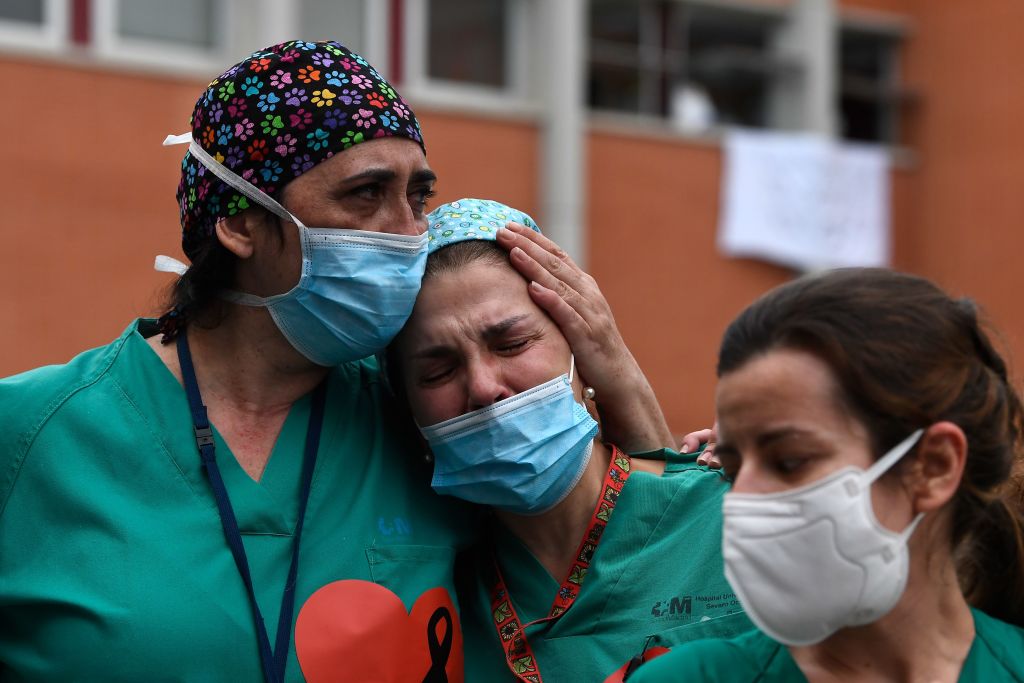COVID-19
An Optimistic Outlook on 2021
The events of 2020 have caused precisely these sorts of setbacks in global collective human progress.

The outlook, scientist Peter Turchin tells the Atlantic’s Graeme Wood, is bleak. Turchin thinks we are looking at another five years—or more likely a decade—of misery. And as 2020 draws to a close, modern civilization does appear to resemble a metaphorical dumpster fire. It really has been a terrible year, possibly the worst most people can remember. Every morning seemed to bring a new global damage report—an endlessly spreading pandemic, mounting death tolls, economies cratered by lockdowns, rising unemployment, racial inequality and civil unrest, spiraling political polarization, election turmoil in the United States, and bushfires in Australia. Countless people are ending the year feeling much further behind than they were on New Year’s Eve 2019. “Surely 2021 can’t be worse than 2020?” feels like wishful thinking.
2020 has felt particularly punishing, at least in part because the decade that preceded it was astonishingly hopeful and productive according to almost every metric of human progress. Extreme poverty was dramatically reduced, from 18 percent of the global population to just 8.6 percent. More than 158,000 people climbed out of extreme poverty every day for 10 years. The child mortality rate was reduced by a third, saving the lives of more than 2.1 million children. Average global life expectancy grew from 69.5 years to 72.6 years.1 The death rate from indoor air pollution decreased by 19 percent, while deaths from climate-related natural disasters decreased by a third, to just 0.35 per 100,000 persons. The proportion of the population with access to electricity, meanwhile, jumped by over 10 percent, from 79.9 percent in 2010 to 90 percent in 2020.
All the while, human civilization produced 28 percent of the total collective wealth of humankind (measured as GDP per capita),2 and our global material abundance absolutely exploded. For most people living in most places, life got measurably and consequentially healthier, wealthier, freer, safer, better fed and watered, and happier—in short, it was a decade in which life dramatically improved. This progress wasn’t anomalous; life has been getting much better for most people for a long time now. Bangladesh started the year 1800 with an average life expectancy of just 25.5 years and a GDP per capita of $876 but finished 2019 with a life expectancy of more than 73 years and a GDP per capita of $4,140. Child mortality in Bangladesh in the 1800s was as high as 40 percent but had fallen to just three percent by the end of 2019. South Korea’s lengthy transformation has been even more startling; the country started 1800 with a life expectancy of 25.8 years and GDP per capita of $462, and ended 2019 with a life expectancy of 83 years and a GPD per capita of $37,300.3

These upward trends haven’t been unbroken by any means—there have been countless setbacks and, occasionally, sickening lurches backwards that have devastated economies and sickened and immiserated populations. The events of 2020 have caused precisely these sorts of setbacks in global collective human progress. The SARS-CoV-2 pandemic has been the cause of much sickness, mayhem, and hardship—it brought almost all international travel to an abrupt halt, it has pushed millions out of their jobs, and it has disrupted trade and supply-lines of critical resources, and goods and services, throttling globalization. Civilization has pivoted away from free movement and free trade and inward towards isolationism and protectionism, embracing a declinist narrative of pessimism and despair. Collectively, we seem to have lost hope that the next five years will be better than the last five. However, these challenges are almost certainly temporary and unlikely to drive most indicators of human progress and collective flourishing back beyond recovery. Notwithstanding the generally grim circumstances in which we find ourselves, there are reasons to be optimistic as we approach 2021.
The pandemic may have exploited the innate weaknesses of globalization, but civilization has never been better prepared to surmount the formidable challenge it presented. The institutions, technologies, systems, services, and scientific advancements of the last two decades have prevented the novel coronavirus outbreak of 2020 from becoming as deadly as the 1918 influenza pandemic. Dramatic advances in medical care, advanced genome mapping, vaccine prototyping and manufacturing, and unprecedented innovation in communications and logistics have ensured that the ravages of the COVID-19 pandemic were not as terrible as they might otherwise have been. Science and technology have furnished us with the equipment, a fleet of highly qualified minds, and global systems capable of bringing together an effective solution to a global problem of this nature and scale. 2021 will see the mass manufacturing and deployment of a highly effective vaccine which will eventually grind the pandemic to a halt over the coming months; a cause, in and of itself, for rational optimism. This in turn will provide the key to unlocking and reopening the gates of embattled economies and restarting the engine of globalization.
The greatest challenge facing our species in 2021 isn’t the pandemic or even economic collapse, it’s a global culture that seems to be ready to abandon ship just as the bulkheads are being sealed and the vessel is beginning to right itself. Nine-tenths of the blueprint to overcoming the challenges of 2020 and making 2021 a successful year lies in our individual and collective hands. Civilization is on the road to recovery, but it’s undoubtably going to be a bumpy journey over the coming year. Because the upward thrust of human development over the last 200 years hasn’t been linear but a jagged upward climb there is no reason to suspect that a downtick—even one as serious as 2020—is a “grand reversal” or a reason for panic.
Earlier this month, I asked Steven Pinker for his thoughts on the metrics of progress leading into 2021. “Many other measures will be worse,” he replied, “but people who expect progress to be monotonic, with every year better than the previous one, may have a mystical idea of progress as a natural force. Progress consists of solving problems, and nothing guarantees that new problems will never arise, nor that they will be solved instantaneously. Infectious disease is the rule among living things, not the exception. The fact that an effective vaccine is ready to be implemented less than a year after the disease exploded is astonishing—even if many measures of well-being will have dipped this year.”
Progress hasn’t contracted nearly as sharply as we might assume, and that is cause for celebration. It’s difficult and counterintuitive to celebrate a year that went as poorly as this one, but things could have been much worse. We ought to celebrate the fact that the outlook is better than it appears, and it’s our responsibility to meet the challenges of 2021 with rational, fact-based optimism. As we close out this terrible year, let us remember that the keystone to a safe and prosperous 2021 lies in our collective capacity to work together as a globalized civilization. As Johan Norberg observes in the opening pages of his 2020 book, Open: The Story of Human Progress, “Homo sapiens is a cooperative species. Compared to many other animals, we are not particularly strong or fast, we don’t have armour, we can’t fly and are not very good at swimming. But we have something else that gives us an overwhelming advantage: we have each other.”

Whether or not I can publish an article next year that makes an optimistic case for progress in 2022 rests in our collective hands. The dismal predictions for the next decade offered by Peter Turchin with which I opened this article are not prophesies. And predictions by their very nature are often incorrect. So let us make the most of 2021 and prove Turchin wrong. The world can be a much better place, and it’s our job to help make it so.
References:
1 Life expectancy at birth, Gapminder, Our World In Data, World Bank
2 Johan Norberg, sources via the World Bank
3 Sections referencing 1800 – 2019 data, Gapminder long run data. https://www.gapminder.org/tools/






